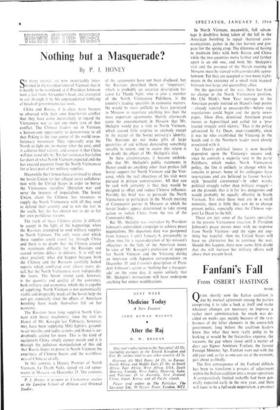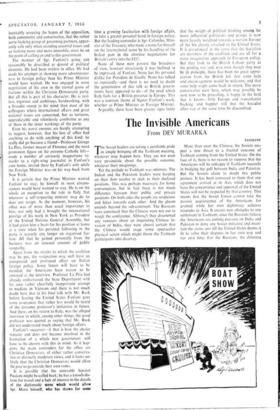Fanfani's Fall
From OSBERT HASTINGS
ROME
QUITE shortly now the Italian coalition is due by mutual agreement among the parties comprising it to take a look at itself and make whatever changes are necessary to improve a rather inert administration. So much was de- cided on weeks ago, mainly because of the rest- lessness of the lefter elements in the centre-left government, long before the coalition leaders knew that what they were really going to be looking at would be the featureless expanse. the vacuum, the gap where stood until a matter of days ago Signor Amintore Fanfani, the former Foreign Minister. Sgr. Fanfani went out with the old year and, as far as one can see at the moment, just about as finally.
The first consequence of the Fanfani debScle has been to transform a process of adjustment within the Italian coalition into a major operation. A comparatively limited reshuffle had been gen- erally expected early in the new year, and there will have to be a full-scale negotiation, a prospect inevitably arousing the hopes of the opposition, both communist and conservative, that the rather sorry-looking group of governing partners, appar- ently safe only when avoiding essential issues and so looking more and more immobile, must be on the point of calling an end to this government.
The manner of Sgr. Fanfani's going can reasonably be described as devoid of political elements. He had been restless in office. He had made his attempts at showing more adventurous- ness in foreign policy than his Prime Minister would have wanted. He was engaged in some negotiation of his own in the eternal game of factions within the Christian Democratic party. But all this is part of his character. He is rest- less, vigorous and ambitious, hardworking, with a broader sweep to his mind than most of his colleagues where international affairs and great national issues are concerned, but as tortuous, unpredictable and relentlessly combative as any of them in the inner workings of the party.
Even his worst enemies are hardly attempting to suggest, however, that his loss of office had anything to do with anything of this kind; he really did go because a friend—Professor Giorgo La Pira, former mayor of Florence and the most prominent figure on the extreme Catholic left— made a number of curiously inopportune re- marks to a right-wing journalist in Fanfani's own home, invited there by Fanfani's wife while the Foreign Minister was on his way back from New York.
It is certain that the Prime Minister wanted Fanfani to stay; he himself in most circum- stances would have wanted to stay. He is on the whole an exception to the rule in Italy that whatever a self-respecting minister may do he does not resign. At the moment, however, his office was of more than usual importance to him; not only had it brought the international prestige of his work in New York as President of the United Nations General Assembly, but it had given him a basis for his position at home at a time when his personal following in the party is scarcely any longer an organised fac- tion. All that he gained personally from the business was an unusual amount of public sympathy.
Apart from the strains to which the coalition may be put, the resignation may well have an unexpected and profound effect on Italian foreign policy. Some fences will have to be mended; the Americans have reason to be annoyed at the interview. Professor La Pira had already embarrassed the State Department with his own rather cheerfully inopportune attempt to mediate in Vietnam and there is not much doubt here that in his final talk with Mr. Rusk before leaving the United States Fanfani gave some assurances that rather less would be heard of the tiresome professor's initiatives in future. And there, on his return to Italy, was the alleged interview in which, among other things, the good professor was quoted as saying that Mr. Rusk did not understand much about foreign affairs.
Fanfani's successor—if that is how the choice remains and does not become involved in the formation of a whole new government will have to be chosen with this in mind. As it hap- pens, the main contenders for the office are Christian Democrats, of either rather conserva- tive or distinctly moderate views, and it looks un- likely that the Christian Democrats would allow the post to go outside their own ranks.
It is possible that the venerable Senator Piccioni might be called back; he has a known dis- taste for travel and a lack of interest in the details of the diplomatic scene which would allow Sgr. Moro himself, who has shown for some time a growing fascination with foreign affairs, to take a greater personal hand in foreign policy. But the leading contender is Sgr. Colombo, Mini- ster of the Treasury, who made a name for himself on the international scene by his handling of the Italian part in the abortive negotiations for Britain's entry into the EEC.
None of these men possess the broadness of view, however vivaciously it was inclined to be expressed, of Fanfani. None has his personal dislike for President de Gaulle. None has talked so repeatedly—and there is no need to doubt the genuineness of this talk as British govern- ments have appeared to do—of the need which Italy feels for a British presence in Europe. This was a constant theme of Signor Fanfani's work, whether as Prime Minister or Foreign Minister. Arguably, there have been greater signs lately that the weight of political thinking among the more influential politicians and groups is now more heavily weighted towards a narrow Europe of the Six closely attached to the United States. It is paradoxical in the sense that the Socialists are members of the coalition and are all for a more imaginative approach to European policy. But they look to the British Labour party as the guiding star and, wise men though they may be in principle, there has been no great appre- ciation from the British left that some help and encouragement would be welcome; and that some help might come back in return. The more conservative view here, which may possibly be seen now to be prevailing, is happy in the field that it knows—little Europe and transatlantic backing --and happier still that the Socialist allies can at the same time be discomfited.































 Previous page
Previous page